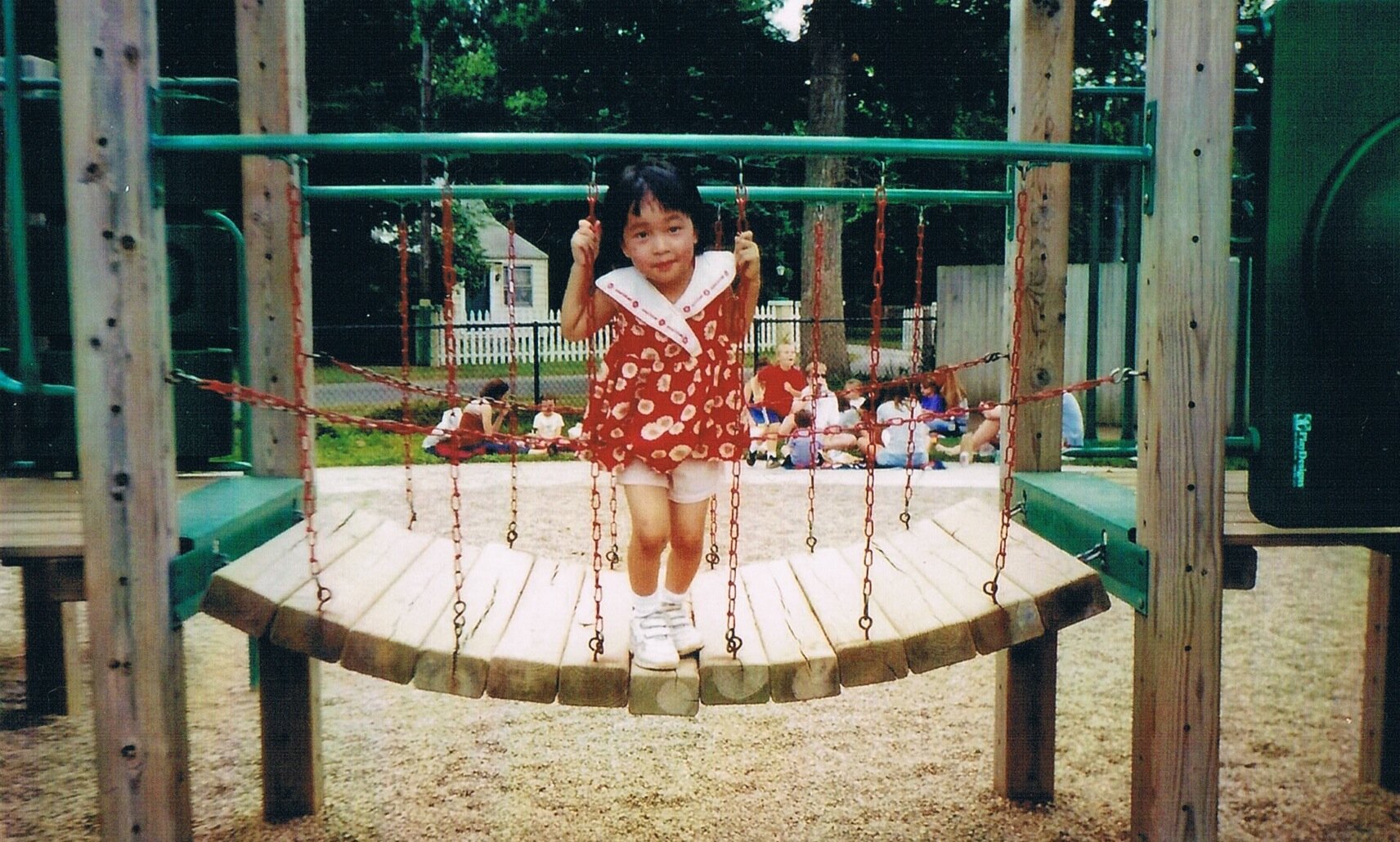The Impetus to Redefine Dichotomies
3: I was born in the States, but Chinese was my first language. During my first day of preschool, I cry the entire day because I don’t understand what is happening or what people are saying. On the second day, my teachers proudly tell my parents that I only cried for half an hour. At this age, I sometimes find myself accidentally speaking Chinese when I mean to speak English.
5: I start elementary school and am put in an ESL (“English as a Second Language”) class, despite being born in the States and speaking fluent English at this point. Luckily, my kindergarten teacher comes to my rescue and pulls me out from ESL.
7: For Chinese New Year festivities at the local Chinese church, two girls and I perform a dance involving twirling batons. My picture ends up in the local newspaper and my parents are elated.
8: I dread attending church. Once the pastor starts preaching, it’s the perfect opportunity for my dad to quiz me on math problems. He has a particular fondness for systems of linear equations.
9: At recess one day a teacher asks me, “Elizabeth are you cold?” I stare at her confused. Who is Elizabeth? Later, another teacher tells me that Elizabeth is a Korean American student the teacher had taught over five years ago.
9: I visit Taiwan for the first time. Language barriers prevent me from forming meaningful relationships with my extended family, but despite this, I feel happy and at home in this new country.
10: My family and I spontaneously drive two hours to Chinatown in Chicago for lunch - it’s the closest place we can find relatively authentic Chinese food.
13: My friend and I have a class together, and we’re the only two Chinese / Taiwanese Americans girls in our year (~300 people). Our teacher nicknames us “twins.” At the time I find this a little endearing and a little embarrassing, but I can’t put my finger on why I feel this way.
14: At one of the few sleepovers I’m allowed to attend that year, I struggle to explain to my friends (who are almost all white) why my parents are so strict. The words “tiger parent” haven’t reached mainstream culture yet and aren’t a part of my vocabulary.
19: I study abroad in Beijing and start to fully appreciate and grieve the culture and the history. During the week, I learn about the Great Leap Forward and the Cultural Revolution. On weekends, we go to places like the Great Wall during the day and Sanlitun at night. One night at a bar, I meet two women from Africa. They speak French and Chinese and I speak English and Chinese, so we converse in Chinese. I marvel at the interconnectedness of the world and how shared language can make the world feel a little smaller.
24: Senior management at the company I work for repeatedly confuses Asian American women for one another. I receive emails and Slack messages meant for other women and am frequently called the wrong name. At the time, the woman I’m most often confused with has brown hair in a pixie cut, while I have long blonde hair.
24: An Asian American friend comments that it’s cool that I’m dating an Asian guy. He’s reminded of colonialism when Asian women date white guys.
25: A Chinese American friend is frustrated that I explain certain idiosyncrasies by saying I’m American while explaining others by saying I’m Taiwanese. He finds this inconsistent. But why should being one preclude me from being the other?
25: A 1.5 generation Chinese American friend and I watch Tigertail. The movie has two storylines: one set in the past about a man who immigrates from Taiwan to the States in his 20s and another set in the present about his relationship with his adult daughter. I’m deeply moved by the movie, and reminded of my relationship with my dad. Discussing the movie with my friend afterward, I realize for him it was just another Netflix movie with little resemblance to his own life. I had taken for granted our similarities, but the movie reveals to me our differences.
25: My Chinese American boyfriend and I find ourselves grappling with and squabbling about mian zi (concept of face), chi ku (literally “eat bitter” but referring to suffering), and diu lian ('“lose face”) - Chinese concepts that have been passed down through generations and ingrained in our existences, despite our American lifestyles.
26: A Chinese American friend comments on how all the Asian Americans she knows have first names with one or two syllables. I remark on my name and my brother’s (both three syllables), and she says I don’t count because my parents came here in their late 20s (as opposed to later in their lives).
These are only a glimpse of some of my Asian American experiences. They’re not representative of everyone’s, but over the years I have laughed and commiserated with others over shared commonalities. There are moments to potentially be angry about, moments to celebrate, and quotidian moments in between.
There are so many dichotomies to being Asian American: you feel like you’re not completely Asian, but also not completely American; you want to make your parents proud while carving out a path that makes you happy; you grow up hearing about American values such as independence and freedom while your parents may come from a collectivist society. The list goes on and on. Growing up in Indiana, I only knew one model for what it meant to be Asian American. Through amplifying and exploring the stories of other Asian Americans, I intend to redefine dichotomies.
